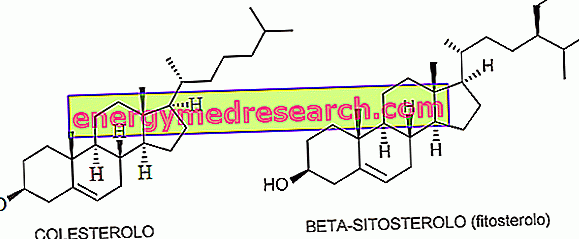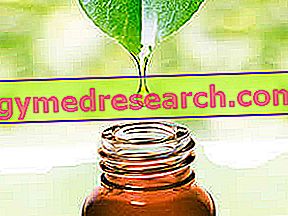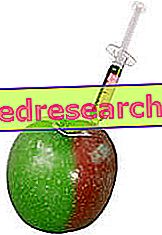Foods that contain phytosterols are all from the plant world (except for ADDED foods).
Phytosterols
What are
Phytosterols are sterol molecules with a structure very similar to that of cholesterol, a lipid of typically animal origin.
How they act
The beneficial action of foods containing phytosterols is to bind cholesterol inside the intestinal lumen, preventing its absorption and favoring fecal expulsion.

In the food
Phytosterol-rich foods
Foods that contain phytosterols are vegetable oils, nuts (walnuts, hazelnuts, almonds, etc.), legumes, some seeds, cereals, fresh fruit, vegetables and lately even added yoghurts (see EC regulation 2004).
Average dietary intake
- The dietary intake of phytosterols normally varies between 150 and 450 mg per day, depending on the subject's dietary habits; for example, in vegetarians' diet the contribution of phytosterols can go up to 700 mg / day and beyond. The most common phytosterols in human nutrition are Beta-sitosterol, campesterol and stigmasterol, which contribute 65%, 30% and 3% respectively to the overall dietary intake. A highly advertised yogurt enriched with phytosterols declares a content of 1.6 g of phytosterols per portion (one vial).
Functional foods
Foods that have good amounts of phytosterols are considered as foods or functional foods as they fall into the category of foods containing nutraceutical molecules, therefore medicaments; nutraceutical molecules are food substances with proven beneficial and protective characteristics for both physical and psychological health of the individual.
Against high cholesterol
Foods containing phytosterols may be useful in the supplementary or adjuvant treatment of lipoprotein disorders; consequently they were included in the guidelines of therapeutic lifestyle change; it is possible to state that in the medium and long term, the consumption of functional foods containing phytosterols can reduce hypercholesterolemia by about 10%, but the efficacy of foods containing phytosterols is closely linked to the way they are taken; in particular, these must necessarily be consumed EVERY DAY, BEFORE the two or three main meals of the day.
An important clarification ...
Phytosterols cannot replace drug therapy against hypercholesterolemia; furthermore, their consumption does NOT allow for the adoption of unhealthy eating habits and, in general, does NOT effectively compensate for genetic and / or family diseases.
Bibliography:
- Products of vegetable origin in medicine, nutrition, herbal medicine and cosmetics. Pharmaceutical and cosmetic technique - M. Silano, V. Silano - New techniques - pag 13-14
- Diseases of the heart. Treatise on cardiovascular medicine. Seventh edition. Volume 1 - DP Zipes, P. Libby, RO Bonow, E. Braunwald - Elsevier Masson - pag 10027
- Regulation (EC) 258/97 C 2004 1245
- Regulation (EC) 333, 334, 335, 336 and 608/2004 of 31 March 2004



